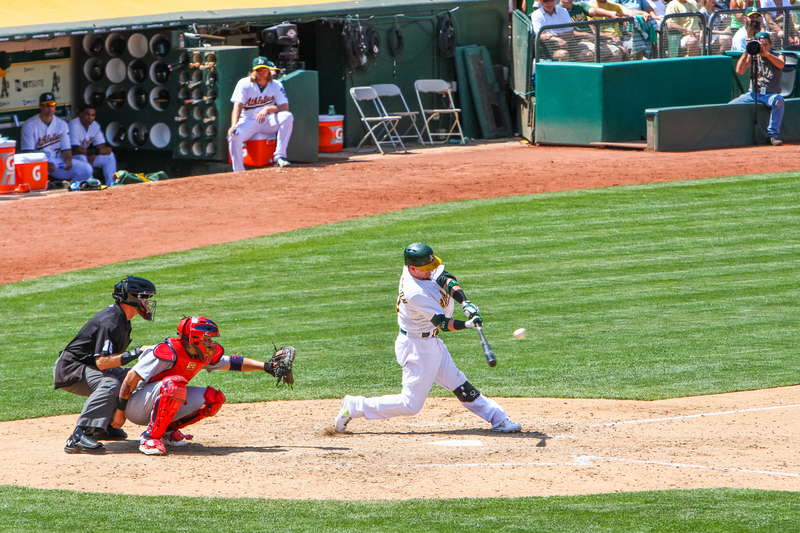Last updated on November 3rd, 2023 at 08:40 am
wOBA is an acronym in Major League and Minor League baseball that stands for weighted on-base average. This formula considers how far on the baseball diamond a player gets via a plate appearance vs. counting getting on base as the same no matter what base it is. For example, wOBA will count getting on second base via a double during an at-bat to be more valuable than getting on first base via a single.
The idea behind this stat is to give credit for the offense value a player can bring to a team. For example, getting on second base increases a team’s run-scoring chances than when you are on first base. Run expectancy is something that sabermetric officials are constantly running via scenarios to see how many runs their team needs to score to win (x) amount of games in a season.
Here is the compelte guide.
How Do You Calculate the Formula?
(.7* (Walks + HBP (hit by pitch) + IBB (Intentional Walks)) +.9 * A Single + 1.25* A Double + 1.6* A Triple + 2* Home Runs / Total Plate Appearances= woBA
The formula can be slightly different when you go to other sites, but I like how FanGraphs breaks it down. As a note, you can change the percentages somewhat if you want walking and singles to be the same value, for example. Like any baseball formula, you can slightly vary the numbers if you believe something deserves more weight than something else.
Example of the Formula
Let’s pretend that we have a baseball player who had 400 At-Bats during a regular season. They had 45 walks, 35 singles, 30 doubles, one triple, and 15 home runs. Here is the breakdown of the formula in simplistic terms.
Walks: 45 *.7 = 31.5
Singles: 35*.9 = 31.5
Doubles: 30*1.25 = 37.5
Triples: = 1*1.6 = 1.6
Home Runs: 15*2 = 30
Total = 132.1
Formula= 132.1 / 400 = .330 wOBA
What is a Good Player’s wOBA
According to Baseball Savant, the average league wOBA in 2019 was .320. In 2019, Christian Yellich had a .442 wOBA, Mike Trout had a .436 wOBA, and Yordan Alvarez had a .432 wOBA to round up the top three players. Here is a quick breakdown of the groupings of a wOBA stat line.
- Great: .400 and More
- Good: .371 to .399
- Average: .320 to 3.70
- Bad: .290 to .319
- Terrible: Below 289
In the formula above, our made-up player had a .330 wOBA stat line. That puts the player right in the average grouping for a good wOBA for a baseball player.
How is wOBA Different from OBP?
On-base percentage (OBP) only counts getting on base against the number of plate appearances you have. That means that getting to second base is worth the same as getting on first base. Some things not included in the on-base percentage are errors, bunts, and the fielder’s choice.
wOBA, on the other hand, gives value to a Major League Baseball hitter reaching a specific base on the diamond from that initial at-bat appearance. For example, predictive analytics illustrate that getting to third base has a greater chance of scoring than a player getting to first base. A wOBA stat is similar to advanced metrics like baseball OPS and baseball WAR (Wins Above Replacement), where they go above and beyond a traditional and straightforward baseball formula.
How is wOBA Different from XwOBA?
While wOBA expands upon OBP, XwOBA expands on the former. XwOBA stands for Expected Weighted On-base Average. The XwOBA takes exit velocity, sprint speed to a base, and launch angle into consideration if a player should get on base.
For example, a player can hit a ball off the bat at 110 MPH. However, that ball lands at the third baseman’s glove due to their shift in the defense. With the XwOBA formula, a team could technically give credit that the player hit into bad luck, but in general, they should be on base due to the quality of their hit.
Conclusion
In summary, wOBA is a potential run value metric players give their team when they get on base from an at-bat. The formula builds off the traditional on-base percentage formula by providing more value in hitting a double vs. hitting a single. One neat thing about wOBA is that you can expand upon it with XwOBA, which is what teams are doing to predict ways an offensive player can bring value to a club.
Similar Posts
What is the Strike Zone in Baseball?
What is a Perfect Game in Baseball?
What is the Triple Crown Award in Baseball?
Greg Kristan, owner of The Stadium Reviews, LLC and TM Blast, LLC, brings his extensive experience visiting over half of the MLB ballparks, along with numerous MLS, NHL, NBA, and NFL venues, to provide in-depth coverage on the bag policy, food options, and parking. He has also been interviewed about his experiences on several sports podcasts.




